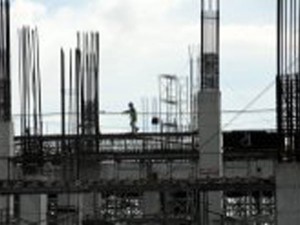
LOWER THAN EXPECTED BUT NOT ALARMING. Workers are seen at a construction site in Manila on Monday. The Philippines said economic growth slowed to 4.9 percent in the three months to March as it was hit by a drop in global trade and less spending on infrastructure. AFP PHOTO/NOEL CELIS
The slower growth of the country’s economy should not alarm investors as the Philippines just happens to be returning to its normal growth pattern after an extraordinary 2010, an economist at British banking giant HSBC said.
HSBC economist Sherman Chan, in a commentary released shortly after the government announced the country’s first-quarter growth figure, also said that with private consumption remaining buoyant, inflation would not likely cool anytime soon.
According to the economist, solid household demand suggested that underlying inflationary pressures were unlikely to recede anytime soon.
“With inflation already in the upper half of the central bank’s target band and is set to breach the upper bound within the next two months, the [Bangko Sentral ng Pilipinas] will maintain its hawkish stance,” Chan said.
She projected the BSP would continue its interest rate increases and end the year with the overnight borrowing rate at 5 percent.
The 4.9-percent gross domestic product growth posted in the first quarter fell short of the market’s expectation of at least 5.1 percent.
Still, it was above HSBC’s forecast of 4.8 percent for the period.
HSBC is expecting further moderation in growth this second quarter, noting that household consumption would likely lose a bit of steam.
In Malacañang, President Aquino remained optimistic that the economy’s growth would pick up despite the disappointing first-quarter growth figure.
Speaking to reporters in the Palace, the President noted that the country did not fare badly despite the political unrest now affecting oil-producing countries in the Middle East and North Africa, as well as the string of disasters in Japan, the Philippines’ biggest trading partner and source of foreign assistance.
Aquino said he remained optimistic over the country’s full-year prospects.
In the second quarter, the government will again pump-prime the economy now that oil prices in the market have started to stabilize, Aquino said.
“We believe our (growth) numbers will improve,” President Aquino said a few hours after economic officials announced the economy’s growth figure.
Data from the National Statistics Office showed that the country posted a trade deficit of $3.368 billion in the first quarter, more than double the $1.441 billion recorded in the same period of 2010.
“The wider trade balance is largely a function of a sharp jump in intermediate goods—imports—which implies a rise in inventories rather than booming consumption,” said UBS economist Edward Teather.